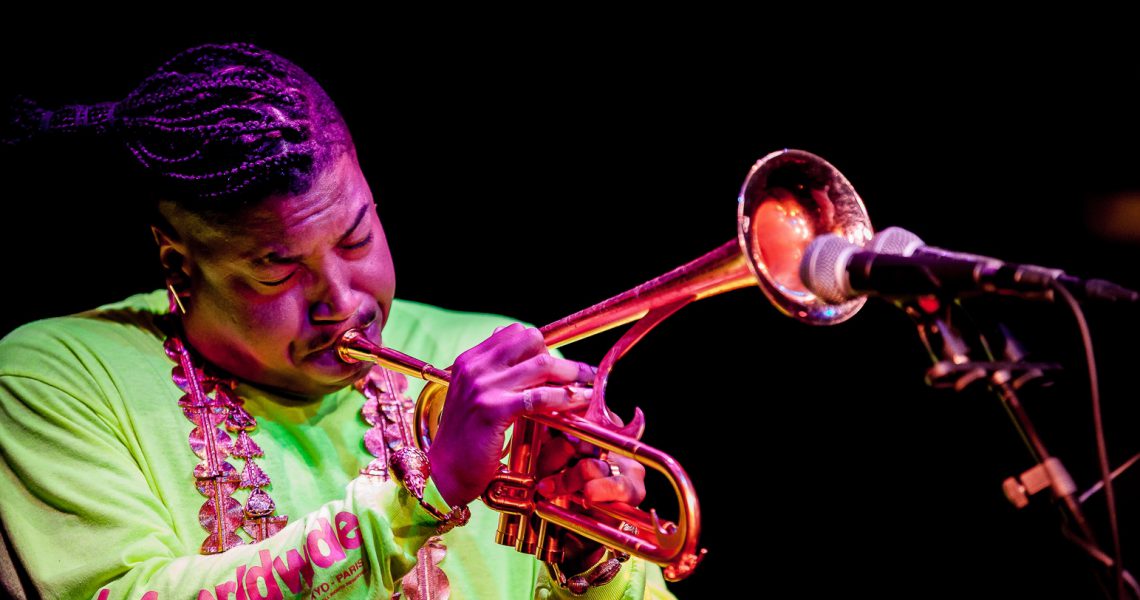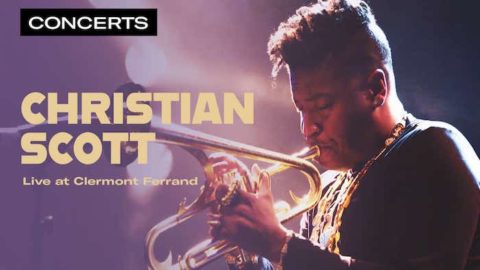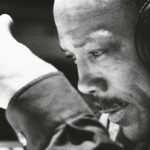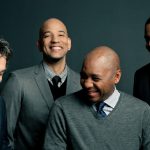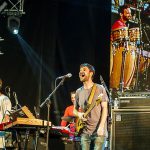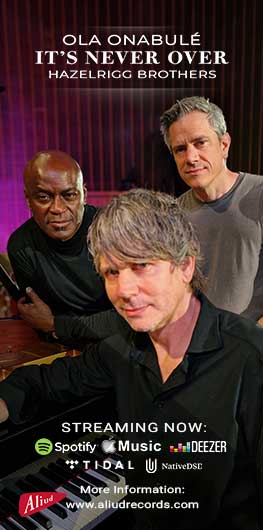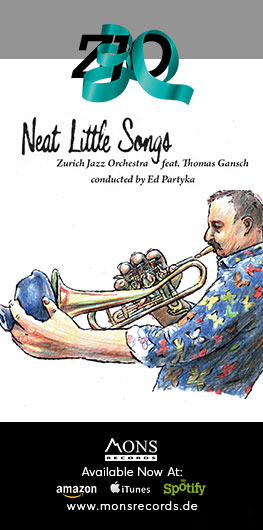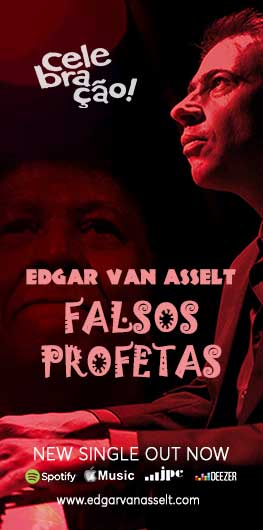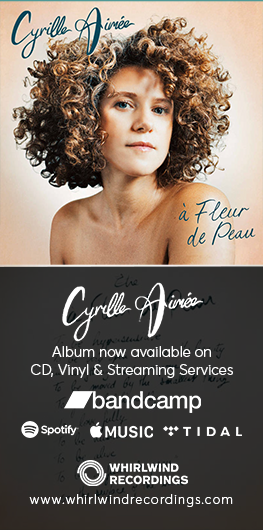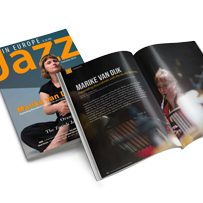In April of this year, Rowan Standish-Hayes sat down with Christian Scott to unpick and unveil some of the thinking that inspired him. Never one to shy away from articulating his mission, Christian discussed the ancestral power he draws from, the importance of illuminating harmony within the rhythm, and the state of modern America.
The album marks the trumpeter’s first full-length project since his Centennial Trilogy back in 2017 – three albums that played into his Stretch Music approach and sought to expand vernacular and cultural expression within jazz. Unsurprisingly, Ancestral Recall is equally unconcerned with singular narratives. However, in the quest to decolonize sound, this new work shifts focus slightly finding its expression in opposition to Western reverence for harmonic and melodic-driven music.
![]()
Christian Scott Live at Clermont Ferrand:
Watch Now on Qwest TV
This groundbreaking live show, recorded at La Coopérative de Mai (Clermont-Ferrand), showcases Scott’s Centennial Trilogy (Ruler Rebel, Diaspora, The Emancipation Procrastination). They play cuts from all three Centennial Trilogy albums, throwing down the gauntlet to the rest of the contemporary jazz world. It is a momentous and unmissable concert.
![]()
For Christian Scott and his community, rhythm runs in the blood. After being made chief of his ancestral clan two years ago, the New Orleanian seeks to show new generations how melodic and harmonic content lies richly embedded within their inherited rhythmic pathways. To do this, he draws on notions of cubist disassembly and on instinctive spiritualism. The tracks are built on unions between historically distant sounds, half-remembered rhythms, and the synergy between ancestry and posterity. Whether we respond through fluid movement or tense paralysis, this is a music that demands to be listened to.
Growing up in New Orleans, you describe music as a unifying cultural force. Can you give us more insight into this?
The black Indian culture in New Orleans is primarily West African. A lot of the things that exist in the musical space, in terms of the rhythms and chanting as well as ceremonial regalia, are part of the synergy between West African and South-East Louisiana Native American cultures.
If you go back to the dim history of New Orleans, when the French arrived and brought African slaves with them, there was no differentiation between the enslaved and their Native American brethren. In the first censuses carried out in the region, both groups were categorized under ‘negro.’ That’s when the blood bond started between them.
At the time and since, the West Africans have wanted to pay homage to the Native Americans, who also gave them safe passage and sanctuary during the experience of slavery. ‘Mardi Gras Indians’ and many other similar terms were created by people outside of that culture. I’d like to be clear and say that it is really an Afro-New-Orleanian culture, one that recognizes the contributions of Native Americans.
How did your personal cultural background feed into your musical outlook?
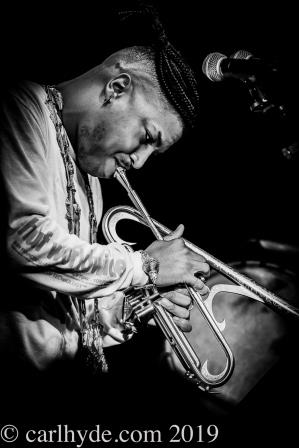 In terms of the musical underpinnings of New Orleans, this is the culture that creative improvised music – jazz music – comes from. Historically, these were the folks in Congo Square and Basin Street, creating collective cultural memories. You got folks like Baby Dodds, one of the first jazz drummers, then Louis Armstrong, Kid Ory … who all talked about seeing and hearing music from these places. Today, the source material we pull from comes directly from my culture. I can’t underscore how important that’s been for my development: not many people get to start at the root of the tree.
In terms of the musical underpinnings of New Orleans, this is the culture that creative improvised music – jazz music – comes from. Historically, these were the folks in Congo Square and Basin Street, creating collective cultural memories. You got folks like Baby Dodds, one of the first jazz drummers, then Louis Armstrong, Kid Ory … who all talked about seeing and hearing music from these places. Today, the source material we pull from comes directly from my culture. I can’t underscore how important that’s been for my development: not many people get to start at the root of the tree.
Growing up in New Orleans, you’re taught through the shared cannon; nothing is written down. In this way, jazz has been learnt, like folklore and storytelling, as an oral tradition that has to be experienced in order. For instance, you can’t just go to Preservation Hall and pull out a trumpet to play “Donna Lee,” by Miles Davis. They would take the trumpet off you, replace it with a cornet and tell you to learn the Tiger Lee Rag first. In my household though, we were exposed to music that preceded the Tiger Lee Rag – some deeply rhythmic music. Now, I love being in a position to disseminate these historical rhythms to the younger generation in my community because it runs in their blood. My grandfather was chief of four different clans, my uncle Donald [Donald Harrison, saxophonist] was also chief and I was crowned two years ago.
What was that experience like? Where was it? And was there music at the ceremony?
My coordination was a really cool moment. It happened in Harlem. We decided to do it there because, though the root of that culture is New Orleanian, these histories and these traditions relate to people all over the country. I wanted to expose Now Yorkians to some American narratives that get left out of our singular approaches. There were hundreds of people there and we sang traditional songs. My brother was actually the one who put the crown on my head and I got to share the moment with all the loved ones I’ve met along the way. My whole extended family. I can’t recall feeling anything as palpable as that. Sharing the old songs with people who had never heard them was beautiful.
Advertisement
How have you informed yourself of this cultural history – has it mostly been through playing music, or has it been more academic, too?
It has been more of an academic study. You do get an understanding of other musician’s cultural narratives when playing with them. And through that, you can try to weave a story, maybe decade by decade … and attempt to put characters together and to gather bits and pieces of American history. But my mother is a historian and I’m a person that just loves history. When I was at Berklee, I did courses on the American Revolution and the West African Empires. I didn’t have many music classes at college.
Our histories are so important – if negative narratives are allowed to manifest around particular groups of people it can be really destructive. I’ve seen first hand how they can become really difficult things to deal with. The American republic is so dense, I felt that I needed to have a firm grasp of my personal history and that of those around me. You can’t change something if you don’t have a context for it.
The title of the album, Ancestral Recall, instinctively makes us think of the past. But you conceptualize its timeline as being more fluid than that. Is it even possible to position your music within linear notions of time?
I don’t believe ancestral power is linear. As a little boy in my culture, when you’re taught martial arts or martial sciences, you learn to tap into your ancestral energy – especially in moments of need. My grandfather’s blood runs through my veins, therefore he is here. I realized that I am my grandfather, at the same time as I am my grandson, too.
Part of the reason why so much work needs to be done in certain cultures is that ancestral memory is clearly present. There’s a lot of generational trauma that needs breaking down, particularly in the Americas, but in the Diaspora, in colonial and African spaces as well. I was born into a West African chieftain and although it all took place in New Orleans, it was basically a Maroon culture. The memory is there. While these tribes may call themselves Creole Wild West or White Eagles in English, I know that the tribe affiliations are actually Yoruban, Loma, Yamasee …
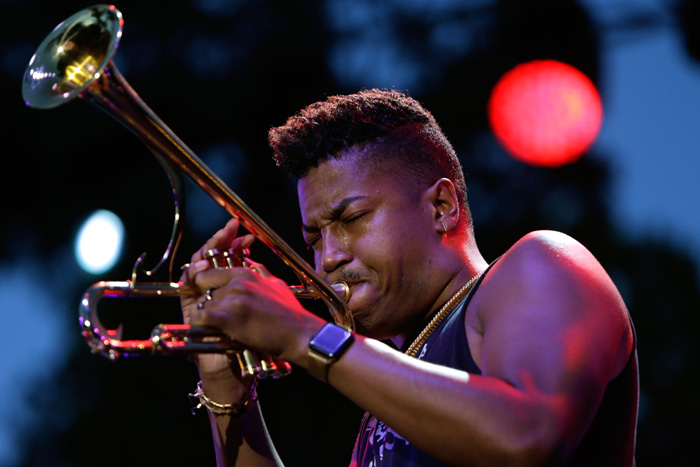
That’s also how music develops. You could have sat me down ten years ago and asked me about West African rhythmic retention and the folklore that surrounds it and I would have been able to reel off information. But for this record, I would say that 60% of the rhythms we used weren’t ones I’d been taught. I began compiling them and spoke with Weedie Braimah [percussion, vocals] and he made me aware that the rhythms I’d been recalling came directly from specific ethio-cultural groups that I had no linear relation to. How was I recalling them…? We played them exactly how they were meant to be played on the instruments they are played on. That was a creepy experience.
Do you think about these things in spiritual terms?
The only thing I do religiously is to make music. But I am a spiritual person. In the chieftain I grew up in, my grandfather made sure that if you wanted to believe in something you had to fully vet it out. If you wanted to touch Islam, he would make you read the Bible, the Torah and even Daoist philosophy alongside the Quran. He would sit with you while you did it.
My music is made to give similar energy to the music you find in spiritual spaces. Weedie Braimah was a great influence on the album because he knows all of the folkloric traditions of West Africa and really has a handle on that. He’s played for every type of ritual you could think of. We were both able to create a sonic document with Ancestral Recall that mirrored the energy of what it feels like to be in ritual spaces. The synergy between cultures and music is astronomical.
Is your music about weaving together different or forgotten vernaculars, ones that you might understand instinctively without fully comprehending them?
Yes, that’s exactly what’s happening. When I was a boy I went to a festival in Malaysia with my family as part of a rhythmic cultural exchange called Thunderous Drums. I saw ceremonial ritual drummers from Guinea, Bali, Japan, Burundi … they were all there. It floored me because I could hear the complete synergy between all of them. That made sense to me before I was even concerned with being a musician. It was obvious to me that at some point, we are all together.
If we are very honest, the way music is presented to us is hyper-racialized and it affects how we interact on a day to day level. When a young musician is learning to play classical music, jazz, or any other kind, the ones with higher harmonic and melodic content are usually seen as being more sophisticated or nuanced or, for lack of a better term, better than rhythmic music. In rhythmic culture, there is always an undercurrent of street myths and tribal myths, which really equate to black and brown myths. My project feeds off that and is centred around the decolonization of sound. I grew up with access to both kinds of music, and I understand how they are able to be equally thrilling, captivating, heart-breaking and heart-wrenching.
In America, we often hear specific descriptions of jazz: “jazz is West African rhythms and western harmony … ” but no one believes that in New Orleans. Yes, European harmonies certainly have an impact, like the use of the dominant 7th chord as a function – Monteverdi definitely did that. But the way it’s used in the blues is quite different. To act like there’s no harmony in West Africa is absurd! Go to that region and I can guarantee you that you will hear the root of the blues. It’s as blues as it gets, just carried differently on a rhythmic level. Ancestral Recall is about illuminating the harmonic and melodic tenants in deeply rhythmic music.
How does that relate to the concept of Stretch Music?
It differs slightly. Stretch Music looks to find the synergy between all cultural perspectives. It seeks to become a conduit for all vernaculars and to unify them under one understanding. In Stretch Music, I could draw as much harmonically from an Indian raga, as I could a Polish folk song, traditional Burundi music or maybe the rhythms of the Saramaka in French Guiana. But this album marks the first time that I’ve made a record that actually sounds like it did in my head. It’s not a group dynamic so the feel is different. The intention is different.
Finding cultural synergy is important to work, but at this moment, we have to do everything in our power to make sure that the next generation isn’t stifled by those who think deeply rhythmic music is less sophisticated than harmonic music. They are stunting the growth of children and here’s the thing: globalism happened. Kids are no longer making bands in their garage. Nowadays, a kid in Bombay can speak to a kid in Kuala Lumpur. To expect that their music will sound like the neighbourhood they live in doesn’t make sense anymore. The tools required for them to make music in the next moment will be the ability to be able to speak all these musical languages.
So often we tend towards the idea of ‘resolve’ in music. But it doesn’t feel at all the case on this record.
We need to re-evaluate what our priorities are. With most Western music, we prioritize things that aren’t so useful anymore – things that harm us and keep us away from each other. I really believe people always have the ability to get along together. But being able to move forward is about having the willingness to honestly confront what has happened, where you have emerged from. This album is different from previous ones because the harmonic tenants are not geared towards finding a safe place to land. It’s about hashing things out in the tension.
Working with McCoy Tyler for years helped me to understand notions of tension and release in music. How can I make a documentary about what’s going on right now in America that has a lot of nicely resolved places to land? They have nothing to do with what Americans are going through. Everyone is on edge. Even those who are part of a ‘dominant’ section of society feel marginalized like their voices aren’t being heard. Making music for human beings who are going through that shouldn’t include happy landings. Listen to Mingus’ music and you can hear that struggle because he struggled throughout his life – it mirrored what he was experiencing and it wasn’t about making something palatable for people. The music is a conduit to inspire thought.
You take inspiration from artistic movements like cubism … agitation, deconstruction, finding and exposing new pathways … can you talk us through it?
That’s a big part of it. In this culture of art, we take an object and we disassemble it and analyse it, then reassemble it in abstraction through a multitude of perspectives. If you walk into a museum and see a Picasso, you might see a man sitting in profile while his eyes are looking directly at you. When I’m looking at these depictions it’s clear that the arrangement seeks to give you a more global sense of what the thing is comprised of. How does that relate to sound? Well, harmonically and rhythmically, I’ll play similar things but with different textures. It might be with the muted trumpet, with the open trumpet, with a flugelhorn, and I have them all coalesce into similar shapes. The reason is to give you more of a global viewing of what that specific sentiment is actually comprised of. Heartbreak will feel different behind a mute, a flugelhorn or through a completely open trumpet up two octaves. It is a conceptual through-line for the album: creating more tension because there is more for you to sift through. When you listen to Ancestral Recall, you either won’t be able to stop moving, or it will cause complete paralysis. As someone who is an audiophile and really heavily into sonic architecture, it’s important to give listeners a completely different reading of sound. Cookie-cutter records … that shit bores me to death.
It feels especially like that on “Forever Girl,” which seems to provide lots of different shades of the same love within the same track. It stays interesting because of that.
Yeah, it’s not syrupy. When music gets too concentrated people stop listening to it. Emotional intelligence is important in every aspect of our lives but in music, it’s really important. You can beat the hell out of a listener and they may love it but they won’t keep coming back to it. It won’t become part of their narrative and a threadline for what helps them heal in their lives. Sometimes the medicine is too good, you get what I mean?
Yes. But do you think that changes when you use lyrics? Are people less open to abstraction when it comes to spoken word?
70% of the time I would agree with that. But access changes depends on the frame and the environment you’re in. In an interview context like this, we can speak openly, but sometimes I find myself in situations where I have to put a muzzle on it. There is so much that I want to articulate about what we are doing and I want people to understand what it is that I’m trying to convey. But I can’t say ‘I love you’ at a moment when you are listening to hate rock … you won’t feel it.
It’s the reason why I picked the trumpet. When I’m talking about socio-economic and cultural situations … those are just words. But when I play the trumpet I’m actually doing some shit. It’s a very different energy. I can talk all day about things but to make them speak on the trumpet requires a completely different muscle. I can get to the meat of what I’m doing, even if it exists in abstraction.
How has it been working with Saul Williams?
He would hate me saying this but it’s how I feel … you could make an argument that this man has a better way of handling the spoken word than anyone to ever use it. If I had to tap someone as a champion to articulate what this experience has been like: being alive and growing up in the American republic – the pain, the trauma, everything you go through day to day in the states – he’s the person I would pick. This record was about feeling each other out and figuring out how we do things together. But this year we are working on a fully collaborative record together which will come out in the next eighteen months. I’m trying to create the perfect frame for him to speak to people.
It’s easier for me than if I was the one writing the lyrics. I sing on the record, but you never hear me using words. When I’m singing it’s more like my trumpet – existing in abstraction. You have to compartmentalize the gifts that you have. Even Malcolm X and Martin Luther King … these guys didn’t write all their speeches themselves, you know?
Can we finish by talking about the environments you create through non-musical sampling? “Shared Stories of Rivals” features a lion roaring, and on “Her Arrival” the background almost sounds like a bustling marketplace.
Putting you in the world is part of our sonic architectural mission. When you listen to this music it’s not divorced from its context, or from any context. Sometimes the act of listening to music can feel like it exists within a vacuum, but it should exist within a space that has space, that has different sounds and energies. For me, it’s so important to tap into that. There are a lot of ambient moments where we use room mics. We even recorded ourselves going for walks outside in nature.
But in the “Shared Stories of Rivals” specifically, we are referencing Sundiata Keita, the first ruler of the Mandinka empire, known as the ‘Lion King,’ and also referred to as Sogo Sogo Simba. That story, which has been turned into a Disney narrative, is actually one of the densest folkloric stories in West African canon and tradition. We want to make sure that we draw on that within the sound palette, that the listener feels the values and icons of the story – of a boy who was born as a cripple, who had to straighten his back by pulling on iron weights. In aid of that, the track includes crackling sounds, there’s fire, you hear iron being dragged and pulled on in the track, you hear the sound of a lion roar.
Photo credit: – Carl Hyde
This interview was first published on Qwest TV on April 08th, 2019
Last modified: July 8, 2019


